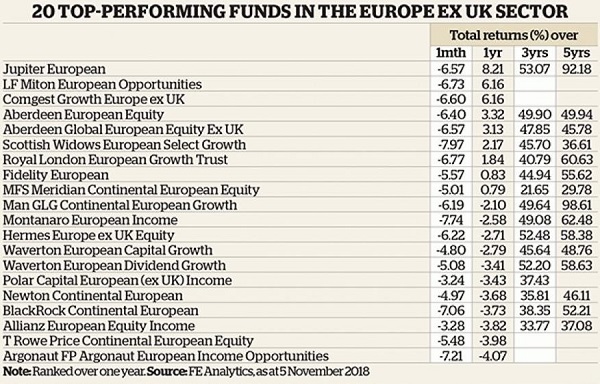The top 20 funds in Europe and potential winners in 2019
7th December 2018 10:36
by Cherry Reynard from interactive investor
The outlook for Europe is clouding as growth in the region slows and political strife proliferates. Cherry Reynard explores the prospects for funds focused on the region.

At the end of 2017, the IA Europe ex UK sector was the place to be. Having shaken off the rising nationalist threat, shiny new leaders such as Emmanuel Macron looked set to take Europe into a new era. This year, in contrast, has reminded investors that Europe is still, well, Europe: mired in political problems, with growth slowing. The performance of European stock markets has reflected that weakness.
In the past year, only the Asia Pacific, emerging markets and China/Greater China sectors have been weaker than the Europe ex UK sector. The average European fund has fallen by 7.1%. Investors have been disappointed that the growth story that seemed so robust 12 months ago appears to be flagging, but the region's stockmarkets have also been hurt by the resumption of political risk. Italy's uncertain election result, Angela Merkel's difficulties in Germany and Brexit have all been stark reminders that the eurozone still has its vulnerabilities.
- Invest with ii: Buy Global Funds | Top Investment Funds | Open a Trading Account
Some fund managers have managed to transcend weaker markets, but only nine funds in the sector are in positive territory over the year. As elsewhere, it has been an advantage to be in technology names. Like investors in the US who have capitalised on the strength of the FAANGs (Facebook, Amazon, Apple, Netflix and Google), investors in European markets have favoured the clear growth trajectory of technology companies and focused their attention on those.

Past performance is not a guide to future performance
This has helped Alexander Darwall at the Jupiter European fund sustain his impressive long-term track record. His fund is up 8.2% over the past year and is top of the sector, supported by strong performance from a number of his technology holdings, in particular his two largest holdings: Spanish IT provider for the travel industry Amadeus Group and German internet and financial services provider Wirecard. Both groups benefited from the strength of the technology sector globally and from robust operating performance, important in a market where weakness has been punished.
There is little pattern to the portfolios of funds that have done well, however. In common with the Jupiter fund, LF Miton European Opportunities has its highest weighting in German equities, but its top holdings look very different. Its largest holding is in Swedish/ Norwegian newspaper group Schibsted Media.
Managers Carlos Moreno and Thomas Brown also hold Ferrari and speciality motor parts group Sika. They hold Wirecard, but at a much lower weighting than the Jupiter fund, which tends to take highly concentrated conviction positions. Fidelity European, also a strong performer, has a more conventional portfolio, incorporating heavyweight European companies such as Nestle, Roche, Total and Sanofi.
While there has been little pattern to those who have done well, the laggards over one year all have a value approach. In general, markets have tended to ignore those companies that cannot deliver strong earnings and growth, even if they appear ripe for a turnaround.
Neptune European Opportunities is a typical example. Manager Rob Burnett has a strong value approach and has been holding more economically exposed companies such as carmakers – Volkswagen and Daimler – and banks, including UniCredit and Commerzbank. Carmakers have been hit by the global trade war, as president Trump has threatened tariffs on car imports.
The FP Argonaut European Alphafund has also had a run of weak performance, with financial services, basic materials and industrials among its largest holdings.
For some, this will be because they have an income mandate as well. Liontrust European Income, Standard Life European Equity Income and Jupiter European Income are all run by capable managers, but they have been held back by the fact that they are unable to hold some of the market's top-performing technology companies, because these businesses often don't pay dividends.
Amaya Assan, research manager at investment consulting group Square Mile, says: "It has been a tough year for European fund managers. There have been no particular themes in the market. However, talking to fund managers in the region, it is clear that if a company has even slightly disappointed the market on earnings, it has been punished. If a manager's style has been value or contrarian, the market has not wanted to know. This type of fund has been really hurt."
Geographic allocation has not made a significant difference. Both the top - and bottom-performing funds have had their highest weightings in German equities. At the same time, given the political upheaval, it might be expected that Italian equities would have been a danger spot, but this has not been a notable trend. Italian equities are down 11.3% for the year to date (FTSE MIB index to 2 November). This is in line with the performance of Germany and Spain.
It is difficult to see a bright future for the eurozone. Its economy is slowing notably. GDP for the region rose by just 0.2% from July to September, down from 0.4% between April and June. That is its slowest growth rate in four years. As growth dipped at the start of the year, there was hope that the eurozone economy would resume the momentum seen at the end of 2017, but that has not proved to be the case. Italy's growth rate has fallen to zero and the country's economy looks likely to fall into recession for the third time in a decade. A rate rise looks some way off, but the European Central Bank is paring back its quantitative easing programme, which may also stall the recovery.
At the same time, there is little cause for optimism on the political climate. Angela Merkel is spending much of her time holding together a fragile coalition in Germany and has said she will not seek re-election. Italy's problems rumble on, with the stage set for a stand-off between the government and the EU over the country's budget.
The European Commission has sent a letter to the Italian government saying that the budget proposal is an "obvious deviation" from prior commitments on an "unprecedented scale", but the Italian government is holding firm. Golden boy Emmanuel Macron is also finding, as have many of his predecessors, that France is resistant to reform.
For investors, this is likely to mean greater volatility after a lengthy period of benign and rising markets. For Dale Robertson, manager of the Chelverton European Select fund , it means that valuation discipline and selectivity are likely to become more important.
He says:
"The economic cycle is mature. We have seen nine to 10 years of uninterrupted growth. To our minds, now appears to be a good time to have real discipline on valuations."
He believes smaller companies look particularly undervalued relative to their history. He has also taken some exposure in Italy, where valuations are lower.
He suggests it is important to avoid the "horse and cart" companies in the region. “It is the structure of corporate Europe that a lot of formerly government-owned companies are poorly run. I suspect, in this environment, the key will not be finding the next Amazon but avoiding these "horse and cart companies."
He is focused on finding the less high-profile tech companies where valuations are less inflated, in sectors such as oil services.
More recently, there has been a shift to value funds. This is a short-term phenomenon, but over the past three months a number of unloved value funds have risen to the top of the tables.
These include Sanditon European, Schroder European Recovery and Liontrust European Income. It is too soon to say whether this trend will endure – and it would be an unusual point in the market for value to outperform – but it is one to consider when selecting a European fund for the next phase in markets.
Fund spotlight: Miton European Opportunities
The LF Miton European Opportunities is coming up to its third anniversary with Carlos Moreno and Thomas Brown at the helm.
They worked together previously at Thames River, but didn't generate the magic they have performed at Miton. The fund sits second in its sector over the past year.
It has managed to perform both when growth strategies were dominant and, unusually, over the past three months when value strategies have been in favour.
They focus on midcap companies with market capitalisations of between £1 billion and £10 billion.
They look for firms with strong returns on capital, around twice that of the wider market, believing this gives companies 'optionality' should the market environment change.
Companies with high returns on capital can reinvest in themselves and grow over the longer term.
The fund is currently running with 15% in Italian equities. Alongside its holding in carmaker Ferrari, it also holds Fineco Bank.
Full performance can be found on the company or index summary page on the interactive investor website. Simply click on the company's or index name highlighted in the article.
This article was originally published in our sister magazine Money Observer, which ceased publication in August 2020.
These articles are provided for information purposes only. Occasionally, an opinion about whether to buy or sell a specific investment may be provided by third parties. The content is not intended to be a personal recommendation to buy or sell any financial instrument or product, or to adopt any investment strategy as it is not provided based on an assessment of your investing knowledge and experience, your financial situation or your investment objectives. The value of your investments, and the income derived from them, may go down as well as up. You may not get back all the money that you invest. The investments referred to in this article may not be suitable for all investors, and if in doubt, an investor should seek advice from a qualified investment adviser.
Full performance can be found on the company or index summary page on the interactive investor website. Simply click on the company's or index name highlighted in the article.
These articles are provided for information purposes only. Occasionally, an opinion about whether to buy or sell a specific investment may be provided by third parties. The content is not intended to be a personal recommendation to buy or sell any financial instrument or product, or to adopt any investment strategy as it is not provided based on an assessment of your investing knowledge and experience, your financial situation or your investment objectives. The value of your investments, and the income derived from them, may go down as well as up. You may not get back all the money that you invest. The investments referred to in this article may not be suitable for all investors, and if in doubt, an investor should seek advice from a qualified investment adviser.
Full performance can be found on the company or index summary page on the interactive investor website. Simply click on the company's or index name highlighted in the article.